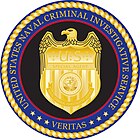Naval Investigative Service
| United States Naval Criminal Investigative Service | |
|---|---|
| Common name | Naval Criminal Investigative Service |
| Abbreviation | NCIS |

Logo of the Naval Criminal Investigative Service
|
|

Seal of the Naval Criminal Investigative Service
|
|

Badge of the Naval Criminal Investigative Service
|
|

Seal of the United States Department of the Navy
|
|
| Agency overview | |
| Formed | 1992 |
| Preceding agency | Naval Investigative Service (NIS) |
| Employees | 2,500 (90% civilian) |
| Annual budget | US$460 million (2009) |
| Legal personality | Governmental: Government agency |
| Jurisdictional structure | |
| Federal agency | United States |
| General nature |
|
| Operational structure | |
| Headquarters | Marine Corps Base, Quantico |
| Special Agents | c. 1,250 |
| Agency executive | Andrew Traver, Director |
| Parent agency | United States Department of the Navy |
| Units |
Several
|
| Field Offices | 16 |
| Website | |
| www.ncis.navy.mil | |
The United States Naval Criminal Investigative Service (NCIS) is the primary law enforcement agency of the United States Department of the Navy. Its primary function is to investigate criminal activities involving the United States Navy and United States Marine Corps, though its broad mandate includes national security, counter-intelligence, counter-terrorism, cyber warfare, and the protection of U.S. naval assets worldwide. NCIS is the successor organization to the former Naval Investigative Service (NIS), which was established by the Office of Naval Intelligence after the Second World War.
The vast majority of NCIS personnel are civilian, roughly half of whom are special agents trained to carry out a wide variety of assignments around the world. NCIS agents are armed federal law enforcement investigators, who frequently coordinate with other U.S. government agencies and have a presence in over 40 countries, as well as on U.S. Navy vessels. NCIS special agents are supported by analysts and other experts skilled in disciplines such as forensics, surveillance, surveillance countermeasures, computer investigations, physical security, and polygraph examinations.
...
Wikipedia

